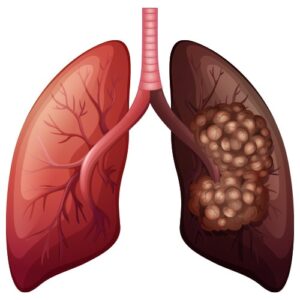Stage 4 lung cancer, also known as metastatic lung cancer, is the most advanced form of lung cancer. At this stage, the cancer has spread beyond the lungs to other parts of the body, such as the bones, brain, liver, or other organs. This stage is characterized by the extensive spread and severity of the disease, making treatment more complex and challenging.
Table of Contents
Symptoms of Stage 4 Lung Cancer
The symptoms of stage 4 lung cancer can vary widely depending on where the cancer has spread. However, common symptoms include:
- A persistent cough that does not go away
- Chest pain or discomfort
- Shortness of breath
- Unintended weight loss
- Fatigue
- Hoarseness
- Bone pain if the cancer has spread to the bones
- Headaches, dizziness, or seizures if the cancer has spread to the brain
- Jaundice if the cancer has spread to the liver
Diagnosis of Stage 4 Lung Cancer
Diagnosing stage 4 lung cancer typically involves a combination of imaging tests and biopsies. The following methods are commonly used:
- CT scans and MRI scans to identify the location and extent of the spread
- PET scans to detect cancerous activity throughout the body
- Biopsy to examine a sample of the lung tissue or other affected areas
- Blood tests to assess overall health and organ function
Treatment Options for Stage 4 Lung Cancer
Treatment for stage 4 lung cancer focuses on managing symptoms, slowing the progression of the disease, and improving quality of life. The main treatment options include:
1. Chemotherapy
Chemotherapy uses powerful drugs to kill cancer cells or stop them from growing. It is often used to treat stage 4 lung cancer because it can target cancer cells throughout the body.
2. Targeted Therapy.
Targeted therapy involves drugs that specifically target abnormalities in cancer cells. These drugs can be effective for certain genetic mutations commonly found in lung cancer, such as EGFR, ALK, and ROS1 mutations.
3. Immunotherapy.
Immunotherapy helps the body’s immune system recognize and attack cancer cells. Drugs like immune checkpoint inhibitors have shown promise in treating advanced lung cancer by boosting the body’s natural defenses.
4. Radiation Therapy.
Radiation therapy uses high-energy rays to kill cancer cells. It can be used to relieve symptoms and control the spread of cancer in specific areas, such as the brain or bones.
5. Palliative Care.
Palliative care focuses on providing relief from symptoms and improving the quality of life for patients with advanced cancer. This can include pain management, nutritional support, and emotional support.

Prognosis and Survival Rates
The prognosis for stage 4 lung cancer varies depending on factors such as the patient’s overall health, the extent of the cancer spread, and how well the cancer responds to treatment. While stage 4 lung cancer is generally considered incurable, treatments can help extend life and improve quality of life. The 5-year survival rate for stage 4 lung cancer is typically lower than for earlier stages, but advancements in treatment are continually improving outcomes.
Living with Stage 4 Lung Cancer
Living with stage 4 lung cancer involves managing symptoms, maintaining a healthy lifestyle, and accessing support services. Patients and their families can benefit from:
- Regular follow-up care to monitor the disease and adjust treatment as needed.
- Support groups and counseling to cope with the emotional and psychological impact.
- Nutritional guidance to maintain strength and energy levels.
- Physical therapy to improve mobility and reduce pain.
YOU MAY ALSO READ: Is Amyloidosis a Myeloma?
Research and Advances in Treatment
Ongoing research is critical in the fight against stage 4 lung cancer. Clinical trials offer patients access to new and experimental treatments that may provide additional options. Recent advancements include:
- New targeted therapies that address specific genetic mutations
- Combination therapies that use multiple treatment methods for better results
- Personalized medicine approaches that tailor treatment to the individual patient’s genetic profile
Conclusion.
Stage 4 lung cancer is a serious and complex disease, but there are various treatment options available that can help manage symptoms and improve quality of life. Early diagnosis, personalized treatment plans, and supportive care are essential components of managing this advanced stage of lung cancer.


Leave a Comment